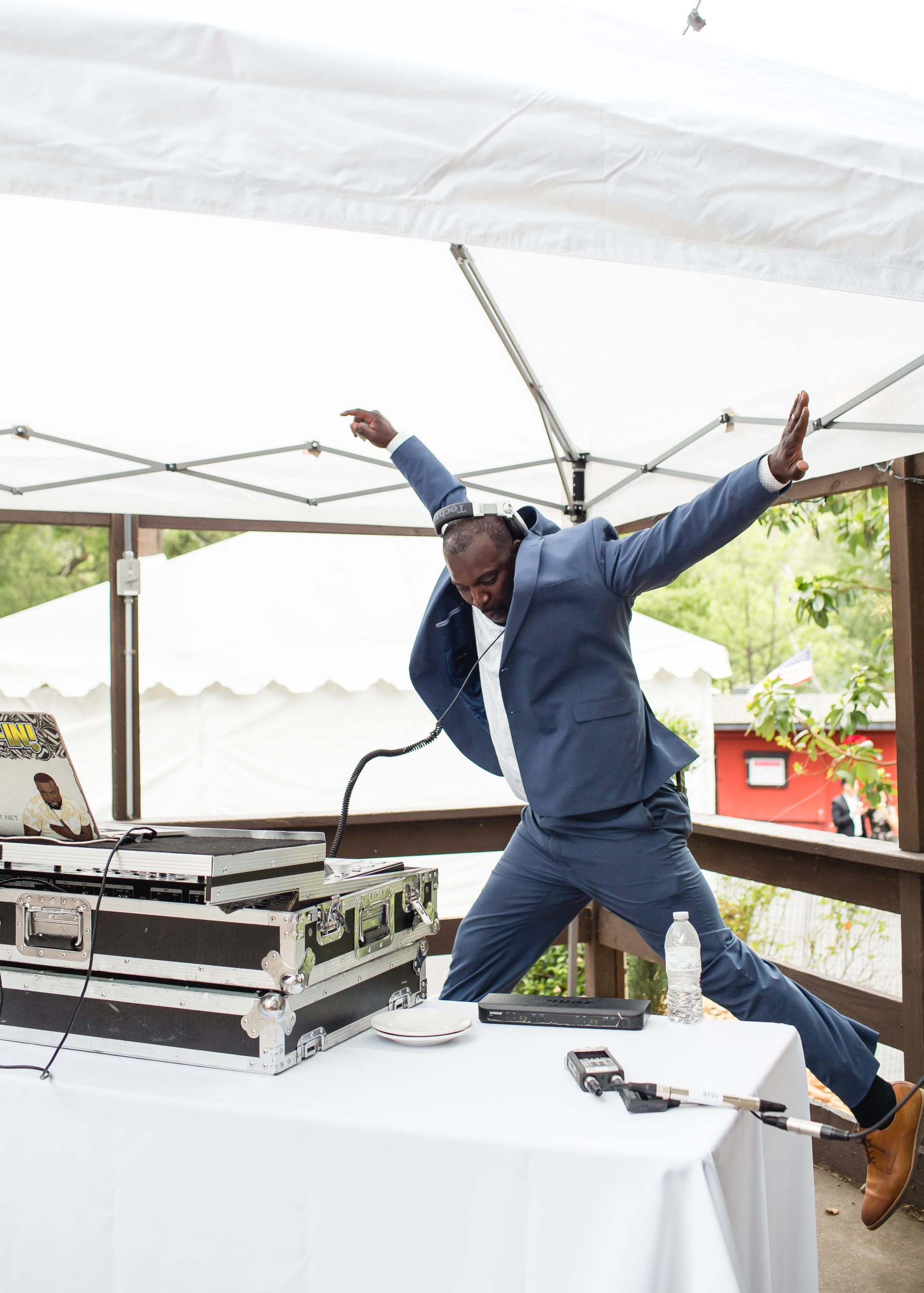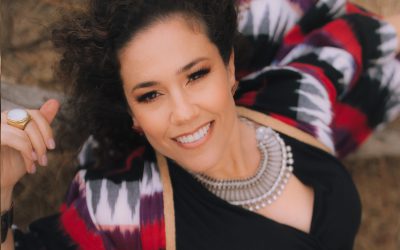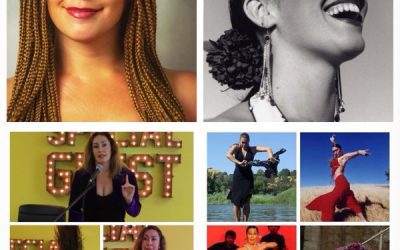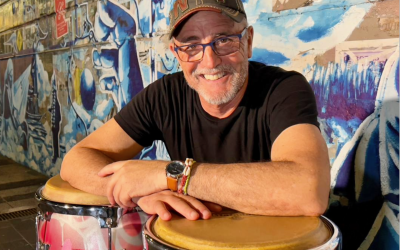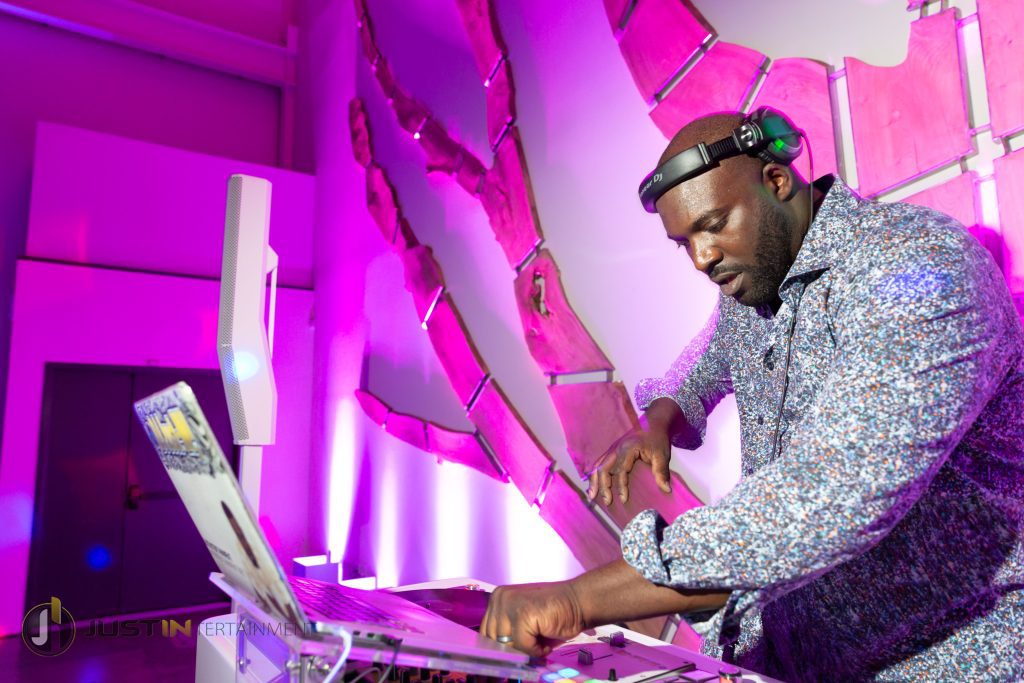
Justin James. Photo by Brian Vega.
Hey Mr. DJ, Put a Record On
Have you ever talked with a DJ before (other than to make song requests)? In this episode I talk with Justin James about what it’s like to be a disc jockey (DJ) and sound artist who uses music and sound to engage people at events. What are the talents needed to get people to start to physically celebrate, raise the energy, go to the dance floor, and come together in response to music? DJs are indeed, masters of engagement!
Dance Floor Architecture
I talk with Justin about his techniques as a master of engagement–as a Dance Floor Architect and his work as the founder of JustINtertainment, an events company with a team of DJs for hire. Justin’s insights will help anyone understand the joy and skill needed to bring customized sound and musical experiences to the people.
Click below to listen to the episode:
To listen to this episode as a podcast, search for Agile Vocalist wherever you get your podcasts.

In this episode you’ll hear:
- Justin’s journey to becoming a professional DJ and founding his company Justintertainment, starting with curating and mixing music together back in the days of cassette tapes.
- How Justin prepares a “crate” in advance for each event. A crate is essentially, a mini-library of songs he anticipates will work for that event. And, how that preparation actually works or doesn’t in the moment!
- Several segments of Justin’s custom mixes of artists, beats, and riffs we know and love.
- What the signals of success and failure are to get a crowd to engage by dancing. Hint: Not every event is intended to be a rager (Justin’s favorite type of event)!
- Justin welcomed me into his home where he treated me (and you, listeners) to a custom sample mix right on the spot. Listen to Justin’s intuitive and heart-led style of songs, sound textures, and creative transitions.
- How Justin customizes sound for events such as weddings where people are from various places around the world.
- The overplayed, tired, and yet obligatory songs that DJs still play, despite their own personal preferences.
- What and who Justin listens to to get inspired, including his favorite DJ, DJ Jazzy Jeff.
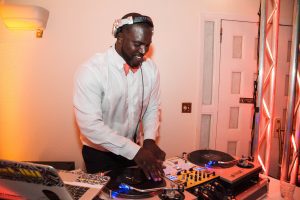
Justin James. Photo by Katie White.
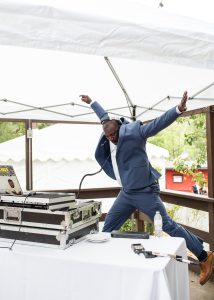
Want more about sound producing artists? Check out the episode with Brian Walker. Learn how he brought the JackTrip technology to musicians during 2020 enabling them to sing together, in real-time over the internet.
Did you enjoy this episode? Subscribe to Sound Cocktails the most politely periodic newsletter -ever. It’s how you’ll hear in advance about February 2022 anniversary shenanigans and antics that YOU can participate in and win fun prizes!
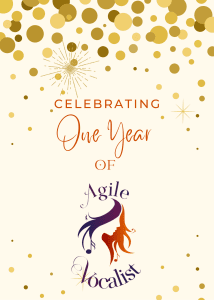
Agile Vocalist is available wherever you get your podcasts.
Episode Transcript:
Narrator: Welcome. Listen to this next Agile Vocalist podcast.
[music]
Justin James: All the rap songs that came out in the last 30 days, there’s thousands, right? So, I feel like I have an unlimited arsenal, if you will- to choose from. It’s easy to stay away from music I don’t really like. Unless, and I’ll play it if it’s a private event and it’s been requested or there are songs that I may have liked in the past, but the only reason I don’t like it is because I’ve played them a million times or I’ve heard them a million times but they still work. I’m trying to think right off the top of my– Montell Jordan. [sings] “This is how we do it.” If I don’t ever have to hear that song again, I’ll be happy.
[laughter]
Rachel: For years, DJ Justin has brought energy, electricity, and one-of-a-kind musical experiences to events throughout the San Francisco Bay Area and beyond. Known for orchestrating the perfect crescendos at occasions of all kinds, Justin ties together unique musical sounds to create the perfect soundtrack for any event.
A great DJ is an artist, Justin is skilled in his craft with deep musical knowledge and a love of all genres. He’s able to connect with diverse audiences and matches mixes to what they want to hear. He’s a professional dance floor architect. Outside of DJing, Justin enjoys, spending time doing just about anything outdoors with his wife and family.
Welcome.
Justin: Thank you. Thank you for having me.
Rachel: All right. Let me just jump in one of the things you said to me when we chatted and started this dialogue for me to learn about your art and your work is, you said you feel like you don’t work a day in your life.
Justin: That’s right.
Rachel: That you create experiences for others and it doesn’t even feel like work to you. Can you tell me a little story? How did you get into this work, this art form? The turntable is the instrument, which is a new thing?
Justin: Sure. Well, I guess we could go back really far to start, I’m like a big music nerd my whole life. I was that kid, both the music side, the technical side, and actually playing instruments. As a kid I remember the very first tape I got and the very– I remember going to the record store at like six years old, picking out albums that I wanted and my parents would buy them for me. I’d work like wash cars and do chores to get these things. I remember listening to the radio, I was the kid that was dubbing with the cassette player.
Rachel: With the cassette player.
Justin: Putting tape over where the cassette, where those little prongs so that you could record over what was on the tape already and putting tape over those and making these mixtapes from the radio. I’d wait till the song I wanted to come on, I’d record it and then I’d wait for the next song, and then I’d record it. Then I’d get 10 or 12 songs that I liked. Then I’d reproduce these and sell them at school for $5.
I’ve been in the music forever. I played the trumpet and the drums starting off in the first grade. Fast forward, had other interests in life sports and football, and got away from music and then got into DJing after college for fun. It was something I wanted to learn how to make the songs mix together. I bought turntables at a yard sale and had a regular job like everybody else that I hated.
I thought I liked it because–
Rachel: What was it?
Justin: I was in sales. I was in outside sales.
Rachel: What’d you sell?
Justin: The longest company I was with was Paycheck. I sold payroll for six or seven years. Then I moved out of that. I sold some digital software and a few other products, but it was all outside sales, relationship building, and all that cool stuff. Was DJing for fun on my own in my bedroom in my attic, at my house, and that led into throwing a party that I was actually going to DJ in my backyard. Threw a party in my backyard, the rest is history. It pretty much, there was a club promoter there that I know, he hired me to DJ at his club and we were off and rolling.
Other people heard me at that club and hired me for other clubs. Then I threw more parties in the backyard and more people heard me and then I started getting birthday parties and more club events and then baby showers and more club events. Then finally weddings. My friends started getting married, so now I’m DJing weddings. You’re at a wedding, and the president of StubHub walks up to you and says, “We want you to DJ our holiday party”, and then the snowball just got rolling.
[music]
Announcer: You’re listening to my favorite DJ. DJ Justin.
[music, Ye, Burna Boy]
Rachel: I’m super curious. What do you do when you’re DJing an event, that’s maybe, I don’t know, corporate event where you just got a bunch of wallflowers? How do you architect that?
Justin: That’s a great question. There’s a couple of different strategies you can use. All right. Weddings are a little bit different than corporate events that are different than– Some events you’ve got to realize that that might be the vibe of the event. Every event is not a rager. I want every event to be a rager.
Rachel: Of course.
Justin: Some events are more of a happy hour for a corporate event where they’re going– they just want the employees to have a time to socialize with each other. They’re not inviting in their wives and their husbands and their counterparts or whatever. It’s just like a eat, meet, greet, hangout type event. You have to understand that and play to that audience.
Then there’s the other situation where you’re like, “This is supposed to be a rager. It’s a company holiday party. There’s 500 people here and we’re not hitting that nail on the head right, just yet.”
Rachel: Just yet. Yes.
Justin: There’s a couple of things, obviously, there’s the traditional things that DJs do. I think they’re corny, but we all do it from time to time. There’s like line dance-type songs where you can– songs that tell people to dance.
Rachel: Like Macarena?
Justin: Macarena is one of them. It’s not maybe the most popular one but, the Cupid Shuffle and the Cha-cha Slide, the Electric Slide, the Wobble. I dread this song and I never play it unless I have to, but even songs like YMCA for the right crowd might be that spark to get people there because the song tells people what to do. People have their hands up and put on their head, but you have to know what crowd to do that for. If you’re with a young, urban crowd, you’re going to completely miss the ball with that. You need to play more of like a TikTok dance type of song.
Songs that tell people what to do work really well. One thing I’ve always noticed about crowds if you can figure out the median age of the folks that are there, this is my opinion, I could be completely wrong, but I think the most important music to people is the music that came out when we were 15 to about 25. Right?
[background music]
Rachel: Yes.
Justin: Because-
Rachel: I got some research that’s exactly that!
Justin: It’s a home run.
Rachel: Yes.
Justin: It’s a home run every time. Now you can be wrong about how old people are.
Rachel: That’s true.
Justin: You might get the genre wrong, but if you play around with it, you can usually find music that’s singable, memorable, the people know the words too. That typically gives– just get things started.
[music]
Rachel: You talked a little bit about dance floor architecture. What other things do you bring to bear? I saw, for example, in your playlist, you’ve got playlists for weddings from all over. You’ve got a South Indian playlist for weddings. How do you architect that? How do you– do you do any cultural research to figure out what’s hot right now as you prep for those events?
Justin: Great, great question. I prepare for every event. However, I never know what I’m going to play exactly or the order I’m going to play it in. For every event, I’ll prepare what we call a crate, which is, in the old school DJ terminology, that’s a actual, physical milk crate full of records.
Rachel: [laughs]
Justin: In today’s art form, we’re playing MP3s from our computer through a mixer with turntables or a controller. We’re basically manipulating those songs in a simulated manner. We’re using the software to help simulate– The hardware simulates what we would have normally done with turntables and a mixer through software. I’m creating a crate, for every event, which is just a folder where I’m going to dump songs into, that I think might work for this event.
Some events, I’m in that crate. Most of the nights, some events, I figure that I’ve made the wrong crate, and I’m out of that crate and back into my general music. Sometimes, I figure that it’s going to go one way, and it goes way different. I never play all of the songs in the crate, it just doesn’t work that way.
To kind of go back to the question about preparation and cultural aspect, for weddings specifically, in the Bay Area, you never know what you’re going to get, which is the beauty of playing music in this place. I could imagine how it might be other places in the country, but I don’t have to worry about that, because I’m here.
One day, I might be– Let’s just talk about this weekend. This weekend, Saturday night, we had an African American groom, Caucasian bride; one was from the Bay Area; one was from the East Coast. Saturday night– no, not Saturday night. Sunday night, we were up at Viansa Winery. We had two African– African bride, African groom, that were the second generation. I don’t want to mess this up. They were born here, but their parents–
Rachel: That’s second-generation.
Justin: Their parents were from Africa, one, East African and one West African. Huge cultural influence. We allowed them to provide the cultural music to help us in that direction. Also, one was a Nigerian family, I’ve done several Nigerian weddings, so I’ve collected the Nigerian music over the years. Then, we do a little bit of research, some Spotify research. There’s record pools that we’re in, that are specific to each genre or culture, that we can do research in.
We call up other DJ buddies, “Have you done a wedding like this before? What’d you play?” That type of thing. Then, you also know that, well, hey they grew up here, so they’re probably not going to want to listen to African music, all night. You also have to understand that, it’s like a big pot, and the songs are the ingredients, for this stew that you’re making. You’re trying to get the right ingredients to not over-season: not too much salt, not too much pepper, just enough of everything, to make this good stew, that is palatable for everyone, at the end of the night.
When things are really crazy, it might be a time to take them back down, from a BPM standpoint or an energy standpoint, so that you can crescendo again. Working things– It’s hard to describe. There’s a lot of things that are happening. I’m looking they’ve given me, I’m looking at the music I think is going to work right. I’m also paying attention to the crowd, what’s working, what’s not. If everybody is leaving the dance floor and going to the bar, I played the wrong song. I got to get out of that. If everybody’s hands up, they’re going crazy, we need to figure out more of that.
[background music]
Rachel: In mixing, you have the beauty, you can just jump in and go with the next song, you don’t have to finish the song.
Justin: Heck no, you never finish the song. [laughs] Absolutely.
Rachel: Right. Okay.
Justin: Absolutely.
Rachel: That’s super interesting, because– It’s just fascinating, because it’s like, what is the psychology of reading what’s going to affect people on a musical level? And you never met them before, you’re just basically looking at them, and you may have– Do you ever ask for a plan of the event? Do you probably have like: if it’s time, take them down.
Justin: I don’t think the plan of the event gives us that much direction. The plan of the event might be, “Hey, we’re going to have cocktail hour. After the cocktail hour, we’re going to have introductions. After the introductions, we’re going to do dinner. After dinner, some toast. After that, we’re going to do first dances, and then we’re into open dancing.” We might get that. For weddings, specifically, we’ll give each couple an opportunity, we have an app where they can go and then drop in some songs or just send us their Spotify playlist, stuff that they like, things that they think are going to be hits at their wedding.
Some DJs are really arrogant, they think they know everything, they think they– I have a team of almost 10 DJs, so I deal with these personalities on a daily basis. Some DJs think that, especially once you’ve had success at 100 events, or 500 events, or 1,000 of events, you think that you kind of got this. I take the other approach, I want to learn, I want to play music that I haven’t played before, I want to see how other songs affect the crowds.
It’s a mix of that, a mix of what the couple thinks is going to work, a mix of what I think is going to work, and we all– as DJs, we have this mental Rolodex of “This happened the last 8 out of 10 times I played this particular song. If you know that there’s a song that you like, personally, that has cleared the dance floor, 8 out of the last 10 times you played it, you might not play that song, no matter how much you like it.
In the adverse, if you have a song that just rocks the dance floor every single time, you– I can play Signed, Sealed, Delivered, you say it’s Stevie Wonder, I can play at every single wedding, almost, and I’m going to get a positive reaction from it. There are certain crowds that might not work for you, you might play it too late in the night or something like that. If you’re a young hip-hop crowd might be like, “Why is he playing this?” They’re going to like the song, though.
There’s those songs like that, that are going to– If you have a dead dance floor play– I can rip the name of 100 songs, but if your dance floor is dead, in most crowds, you can play a song like Jump Around by House of pain. That intro that, when it hits, and you hear that [hums the intro], everybody knows what they’re supposed to do next.
[laughter]
Justin: I’m probably dating myself, a little bit too. The 25-year-olds are like, “What is that, I don’t know that song”, but they’ve all been a part of this party, where that been played in, that the energy just automatically changes right at the drop of a song. Yes, we do give them an opportunity to– couples, an opportunity to give us some direction. We always like to have some room to create.
Rachel: I’m thinking about– Is it Mony Mony? I don’t know how–
Justin: Oh yes [laughs].
Rachel: I’m thinking about Rock Lobster, and I’m thinking about Louie Louie. Again, I’m dating myself [laughs].
Justin: All great tracks, though.
Rachel: Seriously, young folks seem to know the most important– My daughter will come up, I’m like, “How do you know that song?” She’s like, “It’s been on an ad.” I’m like–
Justin: Some ad.
Rachel: On an ad.
Justin: Or it’s been on the radio in your car when you were driving around when they were kids. It’s just–
Rachel: Or, it was in a movie? Movies are recovering things that I love and grew up with.
Justin: Absolutely.
Rachel: “How do you know that song?” [laughs]
Justin: Absolutely. It’s funny, because me and my buddies, were laughing about KBLX, the popular R&B quiet storm radio station. They’re playing– Growing up, that’s what my mom listened to. I was raised on a lot of those oldies that– a lot of R&B, funk soul that they play on KBLX. That’s what I’m used to, from KBLX. Recently, we’ve been hearing them playing songs from Ja Rule and 50 Cent, and these rap songs that were popular in our time, with me growing up, these was popular stuff in high school, college.
I’m like, “Wait a minute, this is not what I expect from KBLX.” A buddy of mine made a point, he was like, “They haven’t changed, we’ve just gotten older. They always play the hits from about 20 to 30 years ago and-
Rachel: [laugh]
Justin: -R&B.” I was like, “I guess that’s 20 to 30 years ago, now. ” [laughs] It all kind of makes sense.
Rachel: That’s interesting because you think, “Oh, it’s the radio station.” You think it can’t possibly be you.
Justin: Yes.
[pages flipping] [music]
Justin: A little something. A little something. A little something.
Rachel: So great. That’s great. A great teaser.
Justin: A little something. I got more where that came from.
Rachel: I’ve got enough friends to throw a party big enough for all that good stuff.
Justin: Oh, man. Well, it’s good I’m here.
Rachel: Oh my God.
Justin: Over here.
Rachel: Do you want to talk about what you did I took a few notes. Just a little bit.
Justin: Okay. What do you hear?
Rachel: What’d I hear? I heard the drop pitch on [sings] “I’m coming out.” I heard a bunch of–
Justin: You know why I did that?
Rachel: Why? To make the singers happy.
Justin: That was Diana Ross. The song I played after that was a song that sampled that 30 years later, Mo Money Mo Problems by Biggie and Mase. They sampled it in a different key. To make the transition sound better, I switch the pitch before I make the transition. This makes the audience a little bit happier.
Rachel: Nice. Then I heard a bunch of things with beats but what really stood out was that thing that sounded like you jumped into a sea of water was like, [mimicking waves] and that’s– went into What’s My Favorite Word? with the beat squeak?
Justin: That was a sample like this.
Rachel: The jump in the water?
Justin: Like this.
[sampler]
Rachel: That doesn’t sound like water now but it did.
Justin: It probably did during– That’s just a sampler. I got a bunch of samples with cool sounds that I’ll use to add texture.
Rachel: Do you make your own?
Justin: I just find the good ones and I just– [laughs]
Rachel: You curate. Okay.
Justin: Actually no, that is not the truth. I do make my own.
[sampler]
Child: DJ Justin.
Justin: That’s my daughter when she was like three or four years old.
Rachel: That’s super great.
Justin: I’ll be in the middle of a mix use that during a– and you hear all the whoosh whoosh that was still going on, while the song is playing.
Rachel: Nice.
[whooshing]
Justin: Scratching is an art form inside a DJing. It’s kind of like turntablism, right? I saw that in one of your questions.
Rachel: Yes.
Justin: We didn’t go over.
Rachel: No we didn’t.
Justin: I feel like scratching is the main component of turntablism. Now, me, I don’t really consider myself a turntablist. I think there’s people that do it so much better than me that I shouldn’t call myself a turntablist, but scratching is the main element of being a turntablist. Manipulating the records in a way basically pushing the record forward and backwards and then cutting it up with a crossfader to make different patterns, is what we call scratching, which is the main part of turntablism. I do a little bit of it to add texture, color, and variety. I don’t think I’m an expert at it.
Rachel: At the beginning, you said drums are one of your instruments.
Justin: Oh yes.
Rachel: Is there anything that carries over from your drum days?
Justin: Heck yes.
Rachel: Talk about that.
Justin: Heck yes. Just drumming like music in general just I always–
Rachel: It’s rhythm.
Justin: It’s rhythm. I always know what I want it to sound like in my head. It’s a matter of if I’m talented enough or skilled enough to make that come out of the speaker. Like I’m counting triplets in my head. I hear like, this is what it should sound like. I’m trying to reproduce that through the speakers.
Rachel: Oh, okay.
Justin: What I would do– All I was doing there is I knew I was going to go to another song. I was going to go to Kurtis Blow, The Breaks, but I had something else playing. I think I had Too Short playing. It sounded something like this. I don’t know it was exactly this.
[music]
Justin: Right?
Rachel: Right.
Justin: First of all, the first thing I did, this is the normal speed here. First thing I did is I sped it up way up here because Kurtis Blow’s a faster song.
[music]
[scratching]
Justin: That’s what I did.
[music]
[scratching]
Justin: It’s just a different way to introduce the song and makes it a little more exciting than it would have been if I wasn’t there. You mentioned something when we were talking and I didn’t really elaborate on. You were like, “Do you play the full version of a song?” That’s another part of DJing that’s tough to figure out. How much of the song do you play?
Rachel: Well, isn’t it a response to the people or not–
Justin: Yes and no. Yes, in that if it sucks you need to get it off quickly. If it’s heating really well, you want it to continue to play but-
Rachel: Do you loop it forward?
Justin: -I’m looking for a– I have looped songs a lot. What I’m looking for is a way to blend the songs together in a way that I don’t lose energy.
Rachel: Okay.
Justin: If I’m at a portion of the song where I know I can go into another song that’s going to take the energy up, I’m going to start blending that sooner because I think they got more from them or just something creative that I think sounds good. There are lots of things that I do here that I’ll try to reproduce or I want to do in my sets. My favorite DJs, I’m always listening to them and trying to reproduce what they did.
My favorite DJ is DJ Jazzy Jeff, I think he’s the most creative at the way he drops and layers the song in. All right, how do I explain this? I think DJ Jazzy Jeff is the best at taking– some people are really good at playing original music. Some DJs are really good turntablism, like you got Scratch Bastid and you have Miles Medina and Qbert. These guys they can scratch-
[scratching]
Justin: -really, really, really good like a drummer. Then you have, Jazzy Jeff, who’s the best at taking the regular song, it doesn’t have to be a remix of the song. The song the way that we know it and the way that he layers it in and plays the part of the song that’s the most for me the best part of the song for you and then he’s out of that song into the next one. Now some DJs when they try to do that people are staring at them like, “Play the whole song.”
Rachel: Right. I’ve seen that.
Justin: “You’re moving way too fast for me. I was liking that song and as soon as I came to the dance floor for that song, you’re off into the next song.” If you do it in a tasteful way, like DJ Jazzy Jeff does, you can play, 30 songs, 40 songs in an hour. You know what I mean?
Rachel: That’s a lot.
Justin: It’d be musical and palatable and it works.
[pages flip]
Rachel: Music is an incredible catalyzer it’s powerful. It brings people together. It’s also used in politics and activism. It’s an emblem of societal change. It can be an anthem for societal change. Have you ever had the privilege to DJ and create for an event that’s maybe not so celebratory or maybe it’s defiant, or it’s a rallying cry?
Justin: Yes. I wouldn’t say all the time. Most of the time I’m hired, it’s for a celebration of something positive. Right?
Rachel: [laughs] Right.
Justin: However, there are on occasion, we are hired to DJ for events that are celebrating something that might not be so joyous. We’ve done funerals, we’ve done repast ceremonies, we’ve done celebrations of life. You know what? I did an event for a non-profit that helps people get off heroin. In that business, some people don’t make it. It is a celebration when people are able to kick it.
I can’t remember the name of the non-profit but it was down in the plaza downtown Oakland. You have a ton of people there, people that are at different points of their journey. I remember they told us play music from people that have had addiction problems or people that have gotten over addiction problems and things like that. A little bit more research there and things of that nature. I guess the biggest event I’ve done almost every single year that has that kind of underlining tone of change and activism is pride.
Pride comes around every year, and I freaking love it. We get booked typically to play on floats in the Pride Parade in San Francisco. From a like “How many people are going to hear what I play” standpoint is probably the biggest event I’ve ever done because there’s– I don’t know how many people show up. 100,000, hundreds of thousands of people. When you’re in the parade, it seems like there’s a million people here.
We’re typically hired by a company, whether it’s Facebook or Equinix Gyms, or StubHub, just to name a few companies, we DJed for in that parade. eBay, we’ve DJed before. We’ll just basically get there a day before, hook up a float, make sure that it sounds really, really, really loud. We get to go through the parade on a float. That’s pretty awesome. Just being real conscious of how this music makes people feel.
Rachel: Are there particular places you go to get inspired, where you’re most creative? Certain things that you do to really spark those juices, I don’t know if that’s finding new music or even playing music?
Justin: That’s a great question. I think really, general curiosity drives this truck, or this ship, or whatever.
[background music]
Justin: I’m always curious to what other DJs are playing. What music came out last week, what music is being played at this kind of club and that kind of club and being generally curious about music and being a bit music nerd and just loving music. It never gets old to me. There’s a couple of– I like different genres of music. If I’m listening to– I think Apple Music does a great job of curating a lot of hip hop and R&B play–hip hop was my first love then jazz.
Now I’m into this crazy experimental music and I love EDM music. That’s a little bit much for a lot of people but I’ll go to EDC and Coachella music festivals and enjoy myself for three days and like nine stages of artists that half of them, I don’t even know who they are and I haven’t heard any of their music. Half of them, I’m going there specifically to see. I’m marking it off on my schedule and I’m like, going there to see. I want to see Kaytranada. He’s one of my favorite producers and I got to see his set, what he’s going to play that’s new, what is he going to remix? What tones? What energy is he going to create for us today?
Then I’m going to see artists that I’ve never heard of or that I’ve never seen. Then I’m just curious to hear what people are doing with music, with sound and how they’re manipulating it. It’s crazy how much variety you can get with just a 12-note scale. You know what I mean? It’s mind-boggling to me.
If there’s artists that come to town, I’m always at shows. My wife wants to kill me right now because we had tickets to shows the night before my son’s birthday party. She’s like, “There’s no way I’m going to that show, you should sell those tickets.” I didn’t sell them in time and I’m like, “Baby, I’m going to the show. I want to hear–” There’s a group, they’re Canadian. They’re not Canadian, they are UK-based. DJ duo that remixes and produces music. They’re called Snakehips and they were here a couple of weeks ago, and I was like, “I’ll just have to be tired the next day. I’m not going to miss it but I got to go to this– I got to go hear what they’re going to play.”
I’m like a feen for it. It’s like, I want more always. There’s certain playlists I listen to every week and try to pick things from and then also just working events every week, really diving into the requests that people were giving me, because that is the tone of what everybody else is listening to.
I don’t listen to the radio a ton. Sometimes I might miss some of the hits as they come out or I might just not like them. If I don’t like it, I’m generally not going to play it or not play it a lot. Like I said, I feel like I don’t work a day. I don’t feel like it’s work to go through a playlist and find what I like out of it. That’s like fun to me. I don’t think I need to be inspired to do this. It’s super fun.
Rachel: When you’re DJing, you personally, how do you balance where you and what you like end and what the crowd wants begins?
Justin: That’s a great, great question.
Rachel: [laughs] It’s not easy though, right?
Justin: First of all, I have a big palate, I think. Where some people are into two or three genres and that’s where they hang out, I hang out in a lot of different places, musically. I have a big musical palate. There’s a lot of music that I like. That gives me a little bit of a edge, I think. I’m not gonna be stuck in one or two genres ever. I’ve never played a set of all one type of music.
Second of all, I think there’s enough music out there that I don’t play much music I don’t like it all. If I hate it, I’m probably not going to play it and since I’m the DJ, and I’m in control, I don’t typically have to play it. Now, there are some caveats there. If it’s a wedding or a private event where somebody has hired us to come into their private space, you do what they tell you to do, period. If they’ve given you some songs to play that you don’t like you play them anyway.
I stay away from music I don’t like and I think there’s enough good music out there. You got to think a bit also, like, most events are anywhere from three to six hours at the most. A wedding might be six hours, not six hours of music, but it’s the whole entire day is six hours. Then you think about how much music there is in the world. Like how much music is there in this country? How much American music is there in this country in this decade? You’re still at millions of songs. You can narrow it down to one genre. Like just all the rap songs that came out in the last 30 days. There’s thousands.
I feel like I have an unlimited arsenal, if you will,-
Rachel: To choose from.
Justin: -to choose from. It’s easy to stay away from music I don’t really like. Unless, and I’ll play it if it’s a private event and it’s been requested for. There are songs that I may have liked in the past but the only reason I don’t like it is because I’ve played them a million times or I’ve heard them a million times but they still work. I’m just trying to think right off the top of my– Montell Jordan, [sings] “This is how we do it.” If I don’t ever have to hear that song again, I’ll be happy.
Rachel: [laughs]
Justin: That’s showing up on so many wedding playlists and people still like that song so I play the song from time to time.
[laughter]
Justin: I don’t really like the song. I probably liked the song when it came out, I was probably in high school or something like that. There’s a ton of songs like that that are just like songs that.
Rachel: They’re victims of their own success.
Justin: Yes.
Rachel: They just get overplayed you’re like, “Shut up already.”
Justin: Yes. The big one for wedding DJs is Love Shack. It’s like, nobody wants to play Love Shack, but we’re playing Love Shack still maybe a quarter of the weddings we’re at. Maybe not so much. Maybe if it’s on their list.
[laughter]
Justin: It’s not a bad song, but it’s just super overplayed and not something I would pick at the top of my list to play.
[laughter]
Rachel: I got you.
[background music]
Rachel: Cool. Do you want to go play?
Justin: Sure yes.
Rachel: Okay, let’s do this in sound.
[music]
Presenter: That was inspiring. Be sure to listen again soon.
[music]
Rachel: Agile Vocalist is created and produced by Rachel Medanic. contributing editors include Ben Kruger and Daisy Owen, design by Amanda Whitesell and Sasha Brandt. With special thanks to my husband Dave.
[music]

